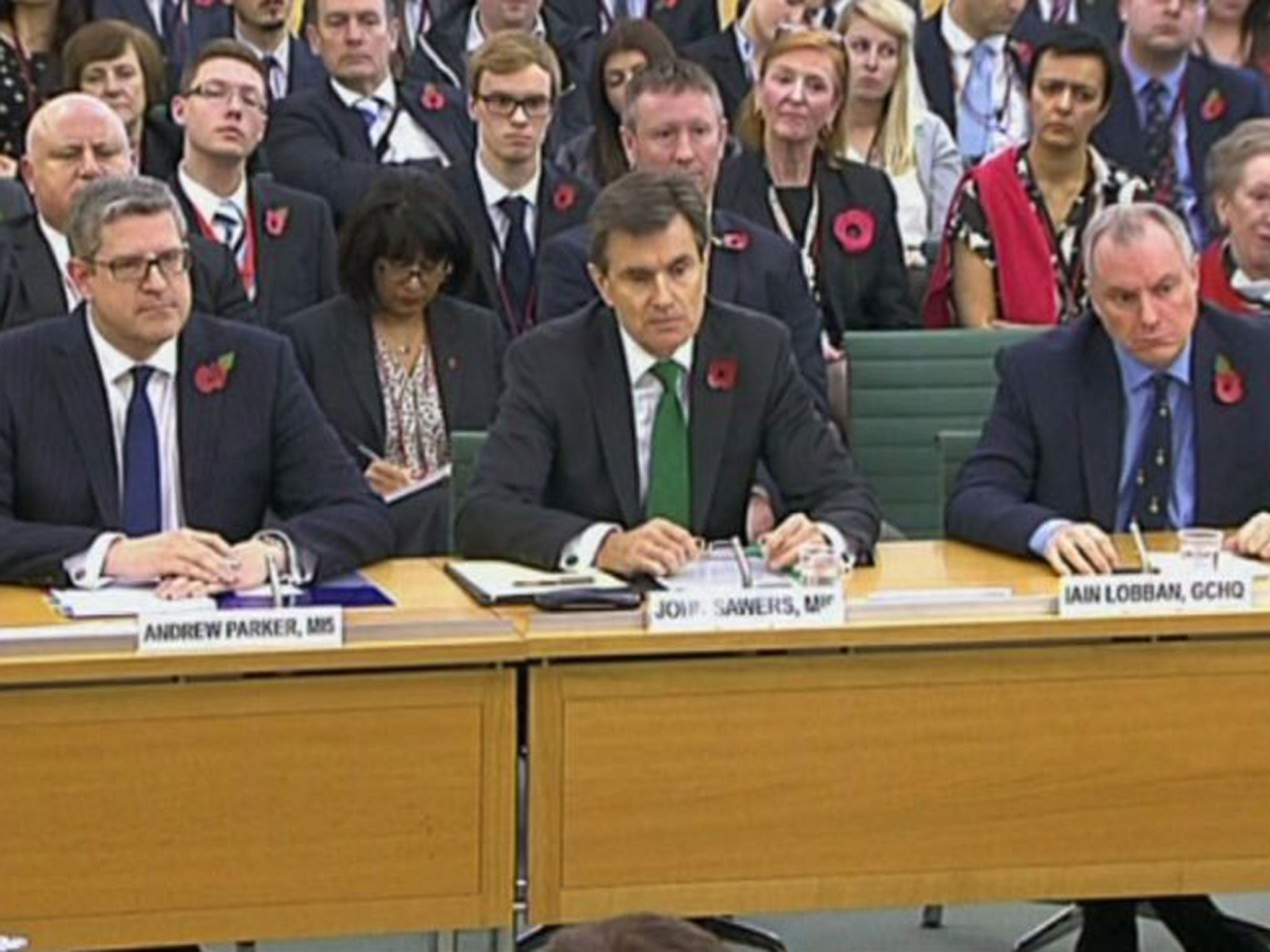Intelligence chiefs break cover, with all guns blazing
The heads of Britain’s security services left MPs in no doubt whom they blame for aiding terrorism

Your support helps us to tell the story
From reproductive rights to climate change to Big Tech, The Independent is on the ground when the story is developing. Whether it's investigating the financials of Elon Musk's pro-Trump PAC or producing our latest documentary, 'The A Word', which shines a light on the American women fighting for reproductive rights, we know how important it is to parse out the facts from the messaging.
At such a critical moment in US history, we need reporters on the ground. Your donation allows us to keep sending journalists to speak to both sides of the story.
The Independent is trusted by Americans across the entire political spectrum. And unlike many other quality news outlets, we choose not to lock Americans out of our reporting and analysis with paywalls. We believe quality journalism should be available to everyone, paid for by those who can afford it.
Your support makes all the difference.There were repeated references to the front line from Britain’s intelligence chiefs when they appeared in the Commons. It soon became clear that they had emerged from the shadows with guns blazing against those they hold responsible for undermining their fight against terrorism.
The leaks from Edward Snowden, the American intelligence official, had weakened the already “fragile advantage” over potential bombers (Andrew Parker, MI5), causing a “sudden darkening” (Sir Iain Lobban, GCHQ). “Al-Qa’ida is lapping it up,” said Sir John Sawers, head of MI6.
The revelations by Mr Snowden, an IT contractor with the National Security Agency (NSA), had led, it was claimed, to terror suspects starting to change their methods of operation, making it harder to track them and leaving the public vulnerable to attacks. Some 34 terror plots had been foiled since the 7/7 attacks killed 52 people in London in 2005, Mr Parker stressed. Suspects were now holding “near daily discussions” of what they were learning from the media about efforts to stop them.
The hearing of the Intelligence and Security Committee was the first time the heads of the Secret Intelligence Service, the Security Service and the Government’s listening centre have given evidence in public, in what was described as a move towards greater transparency.
But it came at a controversial time. MI6 and MI5 have been accused of complicity in torture and GCHQ has been criticised for its work alongside the NSA in intercepting communications. Accusations and recriminations were quick to rise during the 92-minute session.
Sir Iain was asked by the committee if he could “guarantee” his agency was acting within UK law. “We do not spend our time listening to the telephone calls or reading the emails of the majority [of the population]. That would not be proportionate, that would not be legal and we wouldn’t do it,” he stressed. “We don’t employ the type of people who would be prepared to intrude into the private lives of ordinary people. If they were asked to snoop, I wouldn’t have the workforce, they’d leave the building.”
The head of GCHQ then went on the offensive. The leaks were helping not just Islamist extremists and organised crime, but people smugglers and paedophile rings which use the internet, he claimed. When the methods used against them are made public, the effect, he said, is one of “sudden darkening”.
“What we have seen over the last five months is near daily discussion amongst some of our targets,” he said. “We have actually seen chat around specific groups, including closer to home, discussing how to avoid what they now perceive to be vulnerable communications methods, or how to select communications which they now perceive not to be exploitable.”
Asked whether the discussions related directly to the Snowden revelations, he stated: “It is a direct consequence, I can say that explicitly. I am not going to compound the damage by being specific in public. I am very happy to be very specific in private.” Details would be given, he assured the MPs, in closed sessions.
Sir John Sawers took up the theme: “The leaks from Snowden have been very damaging. They put our operations at risk. It’s clear our adversaries are rubbing their hands with glee; al-Qa’ida is lapping it up. Western security has suffered as a consequence.
“We’ve an extraordinarily difficult task. We have to identify and recruit agents in the most exposed places – in the higher reaches of al-Qa’ida, in the countries that are trying to do our country harm, secret states that are trying to do damage to us.
“We need to have the possibility of examining the intelligence, of drawing information that our partner agencies have, in order to identify those very brave individuals that are prepared to work with us against their undemocratic, secretive, oppressive societies, which cause us threat. If you end up diminishing our ability to use technology, we will be less able to have that advantage… and our country will be less safe.”
Asked about government compensation to people tortured supposedly with the collusion of the intelligence service, Sir John said: “I don’t accept the allegations made against us. We are absolutely clear we only operate within the framework of the law.”
Mr Parker warned that the terrorist threat showed no sign of diminishing. “Several thousand” suspects are being monitored in the UK, he said. And “terror tourism” is booming, with hundreds of Muslim extremists heading to Syria to take part in jihad.
Join our commenting forum
Join thought-provoking conversations, follow other Independent readers and see their replies
Comments